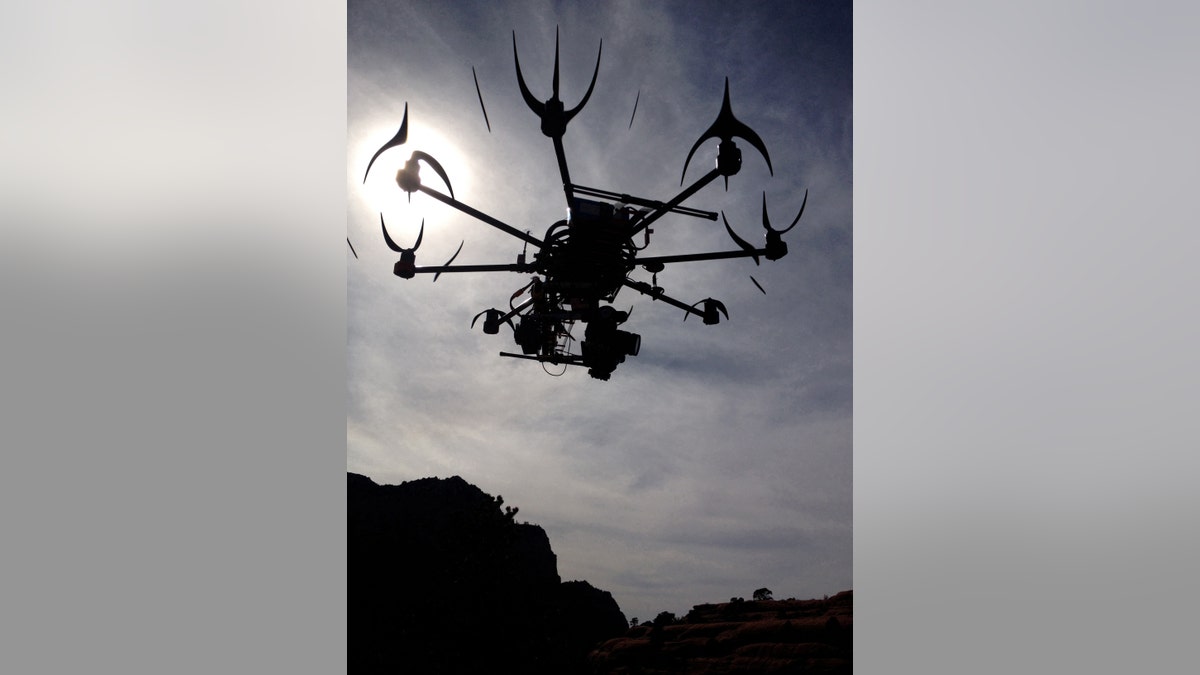
File photo. (AP Photo/Aerial MOB, LLC, Tony Carmean)
The Federal Aviation Administration has unveiled its Pathfinder program, which will study how drones are used for newsgathering, as well as in the agriculture and transport industries.
As part of the program, CNN will research drone-based newsgathering in urban areas, while PrecisionHawk will spray crops in rural areas using drones flying outside of the pilot’s direct vision. The BNSF railway will be using drones, also known as Unmanned Aerial Systems (UAS) and Unmanned Aerial Vehicles (UAVs), to inspect its railroad infrastructure. Like the PrecisionHawk project, the BNSF drones will operate outside the pilot’s line of sight in isolated areas.
“These companies reached out to us in exploring three key types of commercial operations,” said FAA Administrator Michael Huerta, during a speech at the Unmanned Systems 2015 conference in Atlanta. “What we’re trying to understand is what can we accommodate, what can we accommodate safely, and then what do we learn from that.”
Huerta added that the Pathfinder program’s findings will be applicable to the entire drone industry.
The ability to operate drones outside pilot’s line of sight is seen as a crucial stepping stone towards commercial drone use. Retail giant Amazon, for example, one day hopes to make deliveries via drone.
The program was welcomed by the Association for Unmanned Vehicle Systems International (AUVSI), which represents the drone community, and hosts the Unmanned Systems conference.
“We’re pleased to see the FAA recognize the need to keep the U.S. competitive with other countries who are also interested in this technology,” said AUVSI President and CEO Brian Wynne, in a statement emailed to FoxNews.com. “If the next big leaps in UAS innovation are going to occur inside the U.S., we need to lay the groundwork now for more expansive and transformational operations, including beyond line of sight.”
Aviation attorney and pilot Tim McCulloch, a partner at Phoenix, Az.-based Hinshaw & Culbertson, described the Pathfinder Program as interesting given the FAA's longstanding insistence that drones must operate within the pilot's line of sight. "However, I don't think that this change represents a sea change that some appear to think that it is," he told FoxNews.com, in an email. "For instance two of the contemplated program participants who will go beyond line of sight seem to be operators that will be operating in either remote locations (crop surveying) or will be flying clearly defined routes (railroad surveying)."
The FAA’s progress around commercial drones has been a source of frustration for many companies. Amazon, for example, has been a vocal critic of the pace of regulatory efforts for commercial drones. Last year the retail giant threatened to move more of its drone development work outside of America unless the FAA relaxed its rules.
In February, the FAA opened the door to some commercial drone use, granting eight regulatory exemptions to firms working in film and television production, aerial photography, and industrial inspection.
In March, Amazon received permission from the FAA to perform testing of its drone technology. The limited terms of the certificate, however, hardly open the door for Amazon CEO Jeff Bezos to roll out his ambitious Prime Air plan.
Under the terms of the certificate, all flight operations must be conducted at 400 feet or below during daylight hours. The drone must always remain within visual line-of-sight of the pilot and observer, according to the FAA.
Last year an audit report warned that the FAA was “significantly behind schedule” in its attempt to meet Congress’ September 2015 deadline for integrating commercial drones into U.S. airspace. The report by the Department of Transportation’s Inspector General warned that the FAA will miss the deadline, citing unresolved technological, regulatory, and privacy issues.
Follow James Rogers on Twitter @jamesjrogers
